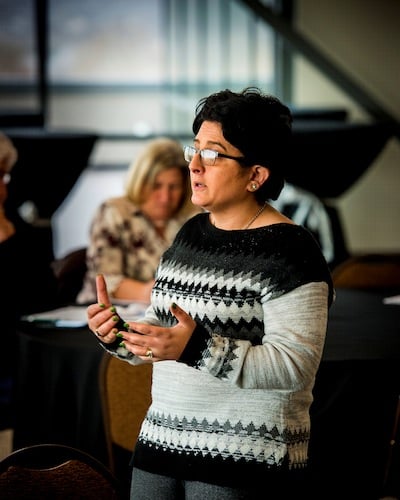Entrepreneurs learn importance of business plans

Jo Ann DiMaggio May
Businesses don’t just happen. At least not successful ones.
That was the message a small but hardy cadre of potential business entrepreneurs took home from a Monroe County Economic Development Corporation program in its “Start-up Southwest Illinois” series of programs March 6 at 11 South in Columbia.
The session — focused on developing effective business plans — was the second in the MCEDC’s business start-up sessions. A third is scheduled for May 19.
MCEDC Executive Director Edie Koch introduced the key presenter, Jo Ann DiMaggio May, Director of the Small Business Development Center for the Metro-East. The center serves nine southwestern Illinois counties and has two offices — one at Southern Illinois University Edwardsville and another in East St. Louis.
DiMaggio May identified the value of small businesses to communities by noting they support 67 percent of all new jobs, new businesses start-ups or business expansion. But they don’t just happen. Rather, successful businesses start with a well thought out, persuasive business plan — a document that may start with little more than a written proposal, but that lays out a well-conceived path ahead. It quantifies ideas and serves as a repeated reality check, burrowing into such details as projected costs of rent, utilities, insurance and legal requirements, that might stymie a new endeavor as it is launched.
DiMaggio May listed the elements of a good business plan, placing them in a logical order and linking them together. A well-developed business plan describes the business’s structure, the proposed services or products it will offer and how they will be priced. It identifies equipment requirements, numbers and kinds of employees that will be required. It gives an overview of the market, including describing competition and importantly, why the new business owner thinks he or she will succeed in that environment.
Critically, it marches a start-up through its first 12 months — month by month. It enables the would-be start-up business owner to project costs and incomes — month by month — to see if they are realistic or if there are specific points or milestones that might spell success or failure. It balances revenues against costs. It identifies a “break even” point.
Then extend the projection into a second and third year, she instructed.
A well-developed business plan is especially critical if the new business owner is going to need to gain financing to bridge the gap between getting started and breaking even.
John Vitale, First Bank Vice President and Business Banking Officer, who partners with DiMaggio May on many of these development sessions, told attendees, “If you come seeking a loan and don’t have a good business plan, I’ll tell you to come back when you do.”
“Underwriters really care about financial projections,” he added.
DiMaggio May spent time describing ways of measuring possibilities.
“Look at competitors’ web sites. In a retail environment, go and walk through their facility. Sit in the parking lot and watch who comes and goes,” she said.
She also discussed surveys to better identify target markets, by gender or age.
At all points, planners should seek to identify what customers or clients want. And they should look for ways to set their idea apart, DiMaggio May said. Meeting a previously unidentified need, or making an existing one better, is a meaningful goal.
At the session’s end, attendees were told to update their plan periodically. What is working? What’s not? What new openings are appearing? And remember, DiMaggio May and Vitale both said, there may come a day when you desire to go a different direction or even to retire. And a dynamic, up-to-date business plan can be a powerful sales tool for the business itself, they said.
In addition to being an essential tool for successful businesses, well-developed plans for new businesses can be sources funding themselves, for the business.
This is the fifth year for the SIUE Metro-East Start-up Challenge. The competition, open to new businesses and those three or fewer years old, offers three prizes: $10,000 for first, $6,000 for second, and $4,000 for third place. While that is unlikely to be all needed to get a business going, it is a nice sum that doesn’t have to be repaid.
DiMaggio May offered her services to any potential and existing business people in the nine-county southwest Illinois region, and can be reached in Edwardsville at 618-650-2929 or by email at sbdcedw@gmail.com.






